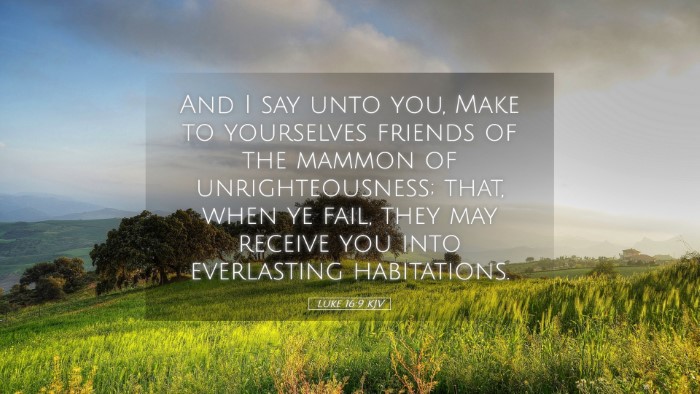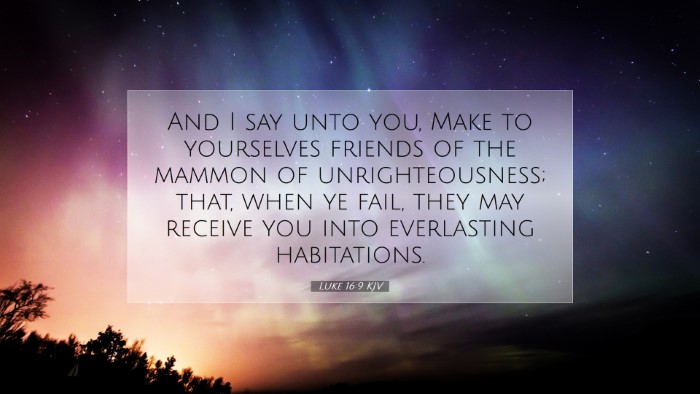Commentary on Luke 16:9
In this verse, the Lord Jesus Christ provides His followers with profound wisdom regarding the use of worldly wealth. His statement—“And I say unto you, Make to yourselves friends of the mammon of unrighteousness; that, when ye fail, they may receive you into everlasting habitations”—is a call to action that has elicited various interpretations and applications throughout Christian history.
1. Understanding 'Mammon'
Mammon is a term often associated with wealth, riches, or materialism. The context implies that this wealth is considered 'unrighteous' when it is pursued greedily or without regard for its moral implications. Jesus uses this term to draw a stark contrast between earthly treasures and spiritual investments.
2. The Importance of Relationships
In this verse, Jesus suggests that the proper use of wealth is to foster and establish relationships. This pursuit of relationships leads to making friends via the "mammon of unrighteousness." The fundamental point here is that wealth, rather than being a self-serving bounty, should be a tool used for the benefit of others.
Insights from Commentary
- Matthew Henry: He emphasizes the wisdom of using our resources to build friendships that hold eternal significance. Henry points out that such friendships will yield rewards in the afterlife, highlighting a dual-focused approach to living—capturing both the temporal and eternal perspective.
- Albert Barnes: Barnes elaborates on the notion that wealth should be expended in ways that can draw others to us, thus leveraging it into the realm of Kingdom work. He interprets "when ye fail" not as a financial bankruptcy, but in reference to the end of life, suggesting that the faithful use of resources may result in eternal rewards.
- Adam Clarke: Clarke comments on the practical implications of this verse, indicating that while wealth can be perishable, its proper use can yield enduring legacy and communal bonds that transcend to heavenly experiences.
3. The Duality of Wealth
The duality presented here arises from the tension between the transient nature of material wealth and the eternal impact that can stem from its wise application. While riches are often seen as an end in themselves, Jesus redirects the focus to the influence and positive connections one can foster through generosity.
Theological Implications
- Stewardship: There is an implicit doctrine of stewardship in this passage. All that we possess ultimately belongs to God, and we are called to manage these resources with the intent of furthering God’s kingdom.
- Eternal Perspective: The idea of “everlasting habitations” draws believers into a broader cosmic view of their lives. The idea that friendships cultivated through the judicious use of wealth can yield eternal rewards serves as a powerful motivator for selflessness.
4. Application for the Believer
For pastors, students, theologians, and scholars, the essence of this verse calls for reflection on how modern believers utilize the resources entrusted to them. It raises significant questions:
- How do we view our wealth in light of Jesus' teachings? Are we investing in eternal relationships or simply accumulating for ourselves?
- What practical steps can we take to ensure that our resources are used for Kingdom purposes? Are we generous with our time, talents, and finances?
- In what ways can the church collectively engage in using material resources to impact the community and build the body of Christ?
Practical Considerations
Pastors and church leaders might consider devising programs that encourage generosity among congregants, not merely in financial terms but also through acts of service and support within the community. Educational series on biblical stewardship and investing for eternity could help foster a paradigm shift among church members.
5. Conclusion
Luke 16:9 is a potent reminder of the mission of Christ—to redeem and cultivate an eternal perspective. By understanding the call to use worldly possessions for the advancement of relationships and the kingdom of God, believers are nurtured into faithful stewards who see beyond the temporal. Investing in what lasts will yield dividends in ways that earthly wealth could never measure. As we engage with the text through the lens of past commentaries, we uncover layers of meaning that compel us towards a more Christ-centered approach to material wealth.
May our reflections upon this scripture move us to act, utilizing our resources not merely for temporal gain but for eternal significance.


